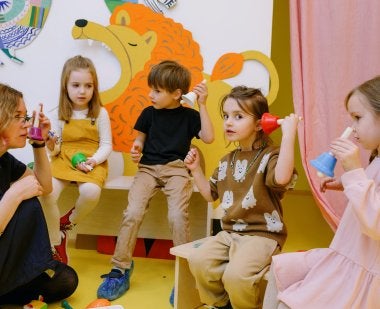
Lynette Russell is an Early Childhood Special Education Instructional Specialist in Prince George’s County Public Schools. This week we interviewed Lynette about ways that parents can help their young children adjust to the new school year.
What can parents do to help their preschool children adjust to the new school year?
A successful start to the new school year always starts from home. One critical tip would be to solidify your child’s sleeping and eating schedule. Over the summer families often get relaxed with children’s bedtimes, mealtimes, and snack times, but now is the time to get back into a regular routine. Be aware of your child’s eating habits. If your child is used to snacking on demand or grazing on food throughout the day, she may have a difficult time adjusting to the more structured meal and snack times at school. And children who are tired and/or hungry will have a hard time focusing in school. Bottom line- make sure that your child gets plenty of sleep and eats a full breakfast every morning.
What if your child has special needs?
Transitions are often a sensitive issue for children with special needs, but there are things that you can do to make the transition to a new school year easier:
- Attend any preschool orientations or before school events. Meet all of the adults that your child will be interacting with- not just the teacher. For instance, if your child has any medical concerns it’s a great idea to meet the school nurse. If you can’t make these introductions before school starts, try to find a time during the first month of school to come in for a visit. It’s important for your child to see you interacting with these adults and learn that these adults can be trusted and relied on for support.
- When you visit your child’s preschool for the first time, bring a camera (or cell phone) and take photos of the different rooms. Use these photos to make a booklet to review with your child. Show your child- this is where you hang your backpack, this is where you will eat lunch, this is where you will go to the bathroom, etc. Seeing photos of the environment will help familiarize your child with her new routine.
- Teach early advocacy. Help your child identify who at school he can turn to for help. For instance, when you are helping your child put on his shoes, you can say “At home Mommy is helping you with your shoes, but at school you can ask Ms. Thomas to help you.” These kinds of discussions will help your child learn which adults are “safe” (they have earned mom’s and dad’s seal of approval), and will teach your child to ask for help when assistance is needed.
What information about the child should parents share with their child’s teacher?
Start by talking with your child’s teacher about your child’s strengths- what is he able to do, where does he shine? Talk about any areas of concern that you have. Remember, many IEPs are completed in April, and during the summer your child may have acquired new strength skills. Be sure to update the teacher on any new developments. Finally, talk about your goals for the school year. What does a successful school year look like to you (as the parent)?
What questions should parents be asking their children at the end of a school day?
Some good prompts are:
- Who did you play with today?
- What did you eat?
- What book did you read?
Make sure you ask your child’s teacher what a typical school day looks like, so that you can ask your child questions related to her routine. For instance, what did you play with in centers today?
If you child is starting preschool for the first time, what are some behaviors that might be typical of the first few weeks of school?
Anticipate some separation anxiety. Your child may need some extra one-on-one time with you during the first couple weeks of school. Anticipate that your child may come home hungry and tired, and that this combination may lead to more tantrums. To alleviate these issues you might adjust your evening routine to include an after-school snack, some snuggle time, and an earlier bedtime.
What if your child is having a difficult time adjusting?
If your child is still coming home unhappy after two weeks, and you’ve tried all of the above tips, talk to your child’s teacher about your observations. Ask if your child seems to be happy most of the time at school, and ask the teacher to tell you about any times that your child does not appear to be happy. Then together, you can work on coming up with a solution. If separation anxiety is a concern, perhaps your child can bring a favorite family photo or stuffed animal to school. If hunger is a problem, perhaps your child can bring an extra snack.
The Center for Early Childhood Education and Intervention conducts high quality research on early childhood education and early intervention programs. You can follow us on X at @CECEIatUMD.